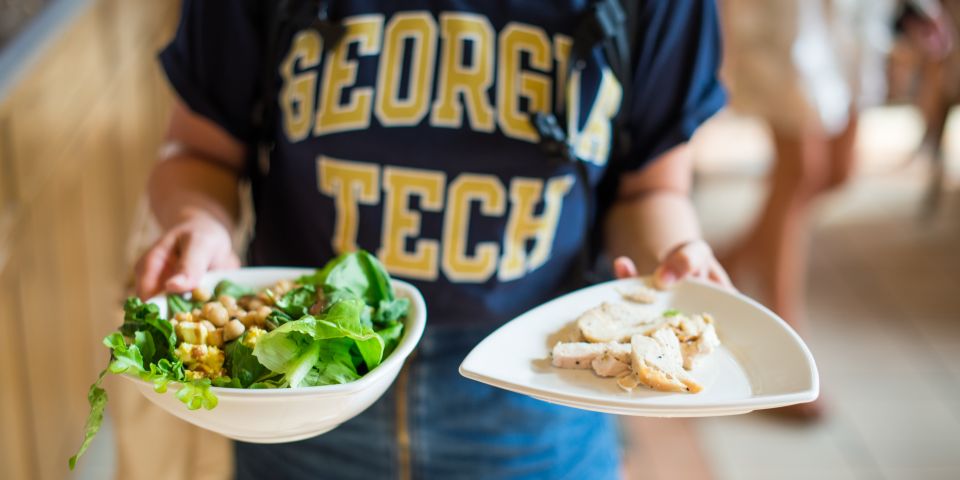Let's Connect
Our friendly and educated team is here to partner with you every step of the way. Connect today to learn of all the ways to partner with The Common Market.
Delivering local food for the common good.

Universities, hospitals and other anchor institutions often look beyond their own regions to meet their food procurement needs. However, there is enormous potential for food service to "WOW" clients by treating food purchases as an investment in local and regional economies. And the higher education segment offers a timely opportunity as students and faculty are demanding a greater commitment to healthier and more mindful food procurement.
Click here to get a FREE case of local food with your first Common Market delivery.
Buying from regional farms not only provides fresh and sustainable food for your client’s dining services, it helps universities meet their existing local procurement goals. Additionally, sourcing local foods brings a significant improvement in overall quality of product. Good food that is healthy, green, fair, and affordable can help distinguish your client’s school as a leader in food service quality and community development.
Where to start? See below for 4 ways to take your food service program to the next level.
1. LEARN. Conduct research to find out what crops or products are unique to the region and in season. Identify the vendors, like The Common Market, that can connect you to regionally sourced, sustainably grown food. Distribution is a major barrier to local food reaching institutions: most farms cannot deliver directly to institutions, and institutions cannot manage the logistics of purchasing from many small farms. Find out if there is an organized network of farmers in your region or other local partners, distributors, or food hubs that can satisfy demand for regional procurement.
2. PLAN. Develop local food sourcing goals with clear criteria, strategy, and a timeline. Engage stakeholders early in your process to build buy-in. Determine the areas where the institution can have impact. Remember, goals should align with your client’s initiatives, be achievable and measurable: for example, percentage of food dollars spent annually or a dollar value invested in an agricultural region. Goals should reflect local seasonal availability to ensure strategies can be carried out.
3. COMMIT. Make it official! Public, transparent, measurable goals keep everyone on track, can increase community support, and strengthen partnerships with suppliers. Be sure to measure progress in pounds of food or dollars spent to make it easy to share your success. Share this news through social media blasts and marketing materials. The Common Market provides each of its customers marketing materials to help them share their commitment to local food. The materials showcase the source of the food, including background on the farmers and their growing philosophies.
4. LEAD. Now you’re a leader. Share successes and best practices through professional networks, conferences, publications, and marketing materials. It’s important to educate and engage relevant parties about your progress towards local procurement goals through point-of-sale materials, special events, and partnerships with organizations that support regional agriculture and economic development.
· Georgia Institute of Technology, Atlanta, GA: Free-range eggs, grass-fed beef, and hydroponically grown lettuce are just some of the offerings available on campus that reflect their commitment to sustainability. Dining services, managed by Sodexo, partners with The Common Market Georgia to help the school reach their goal of supplying 40% of their produce from Georgia or a bordering state.
· Emory University, Atlanta, GA: Since 2007, the college’s Sustainable Food Initiative has made an ambitious pledge to shift its hospital and cafeteria food to 75% local or sustainably grown by 2025. Emory's efforts have started to have real measurable impact through Bon Appetit Management Company and The Common Market Georgia, which started to deliver local food to the institution in 2016.
· Johns Hopkins University, Baltimore, MD: In 2013, JHU's president pledged that 35% of food will meet strict local, sustainable, fair and humane standards by 2020. Food service contractor Bon Appetit Management Company has worked closely with The Common Market Mid-Atlantic to increase production by local growers to meet the university’s substantial demand.
· Lehigh University, Bethlehem, PA: In November 2017, Lehigh University celebrated the signing of the Real Food Challenge pledge — a nationally recognized campaign to shift $1 billion of existing university food budgets toward local/community-based, fair, ecologically sound and humane food sources, or “real food”, by 2020. Since 2015, Lehigh University has sourced over 65,000 pounds of good food through The Common Market Mid-Atlantic and Sodexo, which manages dining services.
About The Common Market
The Common Market distributes farm-fresh foods from a network of nearly 300 family farms and producers in the Mid-Atlantic and Southeast regions and soon Texas. We manage logistics, connecting public and private schools, hospitals, universities, grocery stores and workplaces to good food grown by our region’s sustainable farmers. Get in touch and learn more by clicking here.
Our friendly and educated team is here to partner with you every step of the way. Connect today to learn of all the ways to partner with The Common Market.
"Often as a chef and manager, trying to buy local has been at the least a pain. Building a relationship with The Common Market has completely changed that experience. I know that the product I am buying is local down to the farm where it was grown. I am able to let the students know the people who grow their food so that they feel a real connection to those farmers. I look forward to a long and growing relationship with the Common Market."
— Allen Clark, Food Service Director, Sage Dining Services, Mount Vernon Presbyterian School